|
|
|
Sort Order |
|
|
|
Items / Page
|
|
|
|
|
|
|
| Srl | Item |
| 1 |
ID:
151818
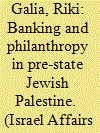

|
|
|
|
|
| Summary/Abstract |
This article focuses on the historical case study of a privately owned bank, analysing the owners’ contribution to the emergence of philanthropic discourse and practice in pre-state Jewish Palestine (1935–1945). The bank’s founder, a Jewish immigrant from Thessaloniki, drew on a long tradition of charitable giving. His philanthropic work targeted members of the local Sephardic community as its main beneficiaries, yet it was often carried out under the guise of general Zionist giving. Philanthropy with particular Sephardic goals was thus habitually construed as contributing to the general Zionist cause. The bank’s genuine commitment to the Sephardic community was not seen as antithetical, however, to business considerations, but rather as a way to advance the bank’s business interests by creating an ethnically defined market.
|
|
|
|
|
|
|
|
|
|
|
|
|
|
|
|
| 2 |
ID:
151823


|
|
|
|
|
| Summary/Abstract |
The privatization process that engulfed most Israeli kibbutzim influenced cultural changes in the Newplast factory. Following organizational difficulties and economic losses, the kibbutz management appointed a factory manager from outside to oversee changes. This management change accelerated inevitable transformations: the collectivist culture, which had previously favoured kibbutz members, became far more capitalistic. Today, the factory operates commercially without obligations towards individuals. Nevertheless, the new management has a dual value system: supporting a capitalistic approach to the worker while fostering the factory’s ‘homelike’ image, preserving some classic collectivist values and expecting its workers to feel a familial obligation to Newplast.
|
|
|
|
|
|
|
|
|
|
|
|
|
|
|
|
| 3 |
ID:
151819


|
|
|
|
|
| Summary/Abstract |
This article examines the gendered digital divide in Israel in the age of the radiophonic cyber-revolution. The research focuses on increased listening patterns to on-demand, radiophonic content via online radio. Recent years have witnessed a shift in the second level of the gendered digital divide. This shift is effectively captured by the notion of ‘can’t’ transforming into a ‘don’t want to be bothered’ mindset. To explore this phenomenon an online survey was conducted on online listeners of a regional radio station. Israel’s top-rated regional station, 103FM-Non-Stop Radio, was selected. The survey was conducted in April 2014. A total of 2013 listeners were surveyed: 1491 men and 522 women. Our results found that for the under 35 years of age listeners increased listening patterns were gender-blind. The same conclusion was reached for other demographic groups: The findings from this group do, in fact, attest to a gendered digital divide. The key demographic groups here are married couples and parents. These trends highlight the continued need for further research into online radio listening patterns and their relationship to gender-related differences in the digital age.
|
|
|
|
|
|
|
|
|
|
|
|
|
|
|
|
| 4 |
ID:
151813


|
|
|
|
|
| Summary/Abstract |
The ugly rhetoric that erupted between Israeli and American leaders in 2014 epitomized the rapid deterioration of the relations between the two leaderships, if not yet the two countries, since Barack Obama became the American president and Binyamin Netanyahu the Israeli prime minister in 2009. To be sure, there have been conflicts between Israeli and American leaders in the past, yet none of them reached the level of personal rancour seen in 2014 with Israeli Defence Minister Moshe Ya’alon disparaging Secretary of State John Kerry’s peace efforts as ‘obsessive and messianic’ and ‘senior administration officials’ deriding Netanyahu as a ‘chickenshit’ and a ‘coward’. Even the much vaunted security relationship between the two states began to suffer in 2014 as the US held up shipments of Hellfire missiles to Israel during its summer 2014 war against Hamas. While a renewal of the bilateral 10-year military aid agreement was signed in 2016, and the ascension of Donald Trump to the presidency may herald an improvement in bilateral relations, it remains to be seen if the damage to the US‒Israeli relationship done in the 2014–2015 period will be overcome.
|
|
|
|
|
|
|
|
|
|
|
|
|
|
|
|
| 5 |
ID:
151822


|
|
|
|
|
| Summary/Abstract |
While Holocaust denial existed even during the Holocaust itself, this phenomenon has substantially expanded and diversified over the past decades. This ranged from the advent of technologies that shifted the debate to new platforms and forums, to Israel’s comparison to Nazi Germany, to Islamist-driven Holocaust denial and anti-Semitism on European streets. Paradoxically, concurrently with the intensification of Holocaust denial by Arabs and Muslims, they have made massive use of Holocaust symbols, language, and discourse in their national struggle. This article presents this paradox ‒ Arab Holocaust denial and Holocaust memory manipulation ‒ in an attempt to identify ways and means to address this phenomenon against the backdrop of the Arab‒Israeli conflict.
|
|
|
|
|
|
|
|
|
|
|
|
|
|
|
|
| 6 |
ID:
151816
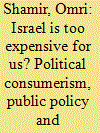

|
|
|
|
|
| Summary/Abstract |
All over the world, political consumerism is on the rise and so is the number of studies. Until the summer of 2011, the use of consumer power in Israel was very limited and political scientists did not focus on it enough. But the social protest and the cottage cheese boycott during that summer were a different experience. Analysing this boycott as a case study, the paper examines the question “Why do political entrepreneurs, the boycott organizers, choose to adopt political consumerism as their main political strategy in order to create a social and political change?” Based on the neo-institutional theory and on the principles of the rational choice theory, the study offers the “triangle of political consumerism’s model” which explains the interaction between the entrepreneur, the “Israel is too expensive for us” (Israel Yekara Lanu) consumer movement, the food corporations, citizens as consumers and the state.
|
|
|
|
|
|
|
|
|
|
|
|
|
|
|
|
| 7 |
ID:
151821
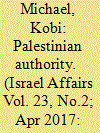

|
|
|
|
|
| Summary/Abstract |
Despite the vast resources poured by the international community into the construction of Palestinian institutions, the PA has failed to build and maintain the infrastructures required for the establishment of a vital, democratic and functioning state. By most common parameters, the PA is a failed entity. Taking into account this experience and the consequences of the last six years of Arab upheavals, characterized by the increasing phenomenon of failed states, there is a need for a paradigm shift that will increase the likelihood of a functioning Palestinian state after a peace agreement with Israel is signed and reduce the risk of its being a failed state that would pose a complex, dangerous challenge for Israel and the neighbouring Arab states.
|
|
|
|
|
|
|
|
|
|
|
|
|
|
|
|
| 8 |
ID:
151815


|
|
|
|
|
| Summary/Abstract |
This article investigates the relationship between trade and politics, particularly the effect of improved or deteriorated political ties upon economic relations with particular reference to the bilateral trade and diplomatic relations between Turkey and Israel. The study attempts to identify under what conditions bilateral trade is affected by any significant change in political relations. It finds that economic relations were relatively bolstered at times of enhanced political relations whereas visible deterioration or decline was observed in the volume and state of trade relations at some critical points when diplomatic relations worsened. However, this does not refer to a constant and steady decline and is limited to some severe diplomatic crises experienced in bilateral relations. Some major premises of Realist and Liberal theories are employed to analyse the findings in this study. These findings are at least partially against the main arguments in the literature of the Liberal approach that trade determines politics. However, the course of trade relations between Israel and Turkey appears to be consistent with the tenets of the Realist theory which pays greater attention to security than it does to trade relations and argues that trade may not be relevant to improved bilateral political relations.
|
|
|
|
|
|
|
|
|
|
|
|
|
|
|
|
| 9 |
ID:
151810
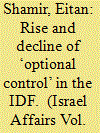

|
|
|
|
|
| Summary/Abstract |
Mission command is a command philosophy that denotes decentralized leadership; it is a philosophy of command that requires and facilitates initiative in all levels of command and encourages subordinates to exploit opportunities by empowering them to demonstrate initiative and exercise personal judgement. In its first decades of existence, military analysts portrayed the Israeli command system as such and termed it ‘optional control’. The primary objective of this article is to explore the rise and decline of ‘optional control’ in the IDF. The first part of the article follows the development of optional control in the IDF’s first decades of existence until the 1970s. The second part of the paper will describe its decline through the analysis of command in recent IDF military campaigns. The last part is analysis; explanation for the decline in mission command is attributed to four major factors: the changes in Israel’s society and thereof in civil‒military relations; the changes in character of military operations; the lack of appropriate military education; and the role and impact of new technologies on the IDF. The combined effect of these factors impedes the ongoing efforts of the IDF to re-establish mission command as its preferred command philosophy.
|
|
|
|
|
|
|
|
|
|
|
|
|
|
|
|
| 10 |
ID:
151814
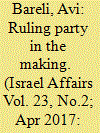

|
|
|
|
|
| Summary/Abstract |
The article discusses the transformation of Mapai, the main political party in Israel’s pre-state years, into the ruling party of a sovereign state. By way of doing so Mapai went through three distinct stages, from striving to build a working class of rural and urban labourers, to seeking immediate statehood via rapid mass immigration and partition, to acting as an effective ruling party, or the ‘party of the state’ as it called itself, following the November 1947 UN partition resolution. It was in charge of creating the machinery of government during a time of war, and this fostered hierarchical patterns characteristic of a sovereign rule, notably the independence of the government vis-à-vis the political parties, including Mapai itself.
|
|
|
|
|
|
|
|
|
|
|
|
|
|
|
|
| 11 |
ID:
151811
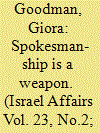

|
|
|
|
|
| Summary/Abstract |
The October 1973 war severely tested the relations of the Israeli government and military authorities with the national and foreign news media. Much has been said about the role of government and military press control and news management in muting and failing to bring to public notice the increasing signs of Egyptian and Syrian intentions before the war’s sudden outbreak. This article will focus on Israeli army news management during the war itself, a complex military campaign which opened in great disarray and with setbacks. Largely based on recently available archive material shedding light on the IDF’s wartime press work and on discussions and decision-making in the IDF high command, the paper examines the ways in which government and military sought to control and manage news reporting in the domestic and foreign media. It charts in particular the reasons for the growing distrust of statements by Israeli leaders and officially disseminated information in the early stages of the war, as well as the difficulties of the military apparatus in controlling the media, even when defeat turned eventually into victory. More than 40 years later, the issues discussed remain pertinent.
|
|
|
|
|
|
|
|
|
|
|
|
|
|
|
|
|
|
|
|
|